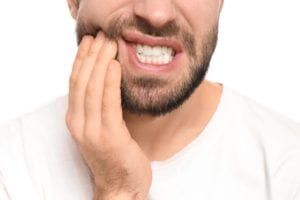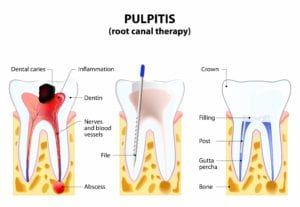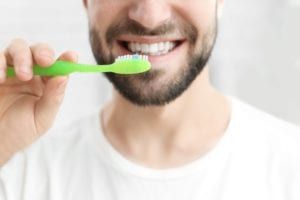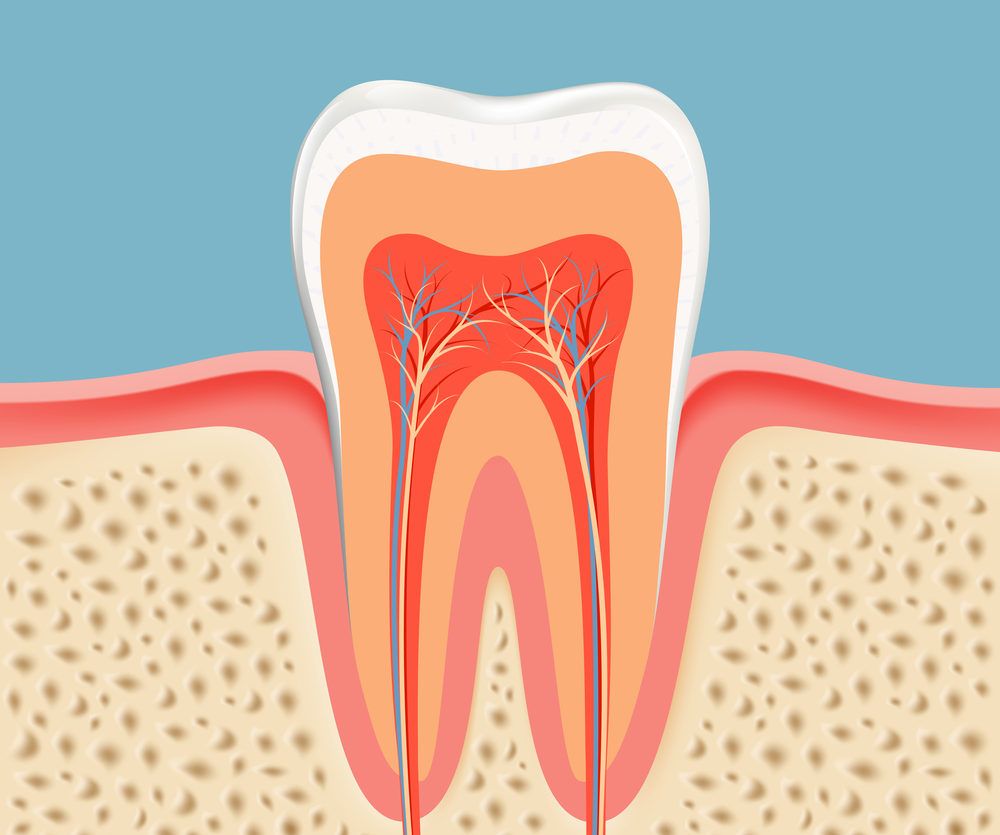Root canals are common dental procedures performed when the tooth’s pulp becomes infected. The pulp is the innermost layer of your tooth and contains nerves and blood vessels. Unfortunately when the bacteria that cause tooth decay reaches the pulp, they cause it to become infected and inflamed. This often leads to sudden, severe pain. If not treated, the infection will continue to spread and can cause an abscess to form at the bottom of the tooth roots. Root canals effectively remove all the decayed and diseased tissue from the inside of the tooth, eliminating the infection and alleviating inflammation.
Did You Know?
Although many people believe that root canals are extremely painful, they are actually no more uncomfortable than getting a dental filling. In fact, most of the pain associated with root canals is actually caused by the infection in the tooth and not the procedure itself. Because of this, root canals actually alleviate the pain rather than cause it.
Frequently Asked Questions:
Do I need a root canal?

You may need a root canal if you are experiencing sudden and/or severe tooth pain, swelling around your gums, tooth sensitivity or discoloration, or if you are unable to bite or chew. If you are experiencing any of these symptoms, even if they are mild, it is important to schedule a consultation with Drs. Chris and Kristie Vinson to have them find the cause of your symptoms. It is important to note that if your dental pulp is infected, you will need a root canal.
Will my root canal hurt?
During your root canal treatment, your mouth will be anesthetized and you may be offered dental sedation if requested. As such, you should not feel any discomfort during the procedure. In fact, most people note that root canals are no more uncomfortable than getting a dental filling.
However, infected tooth pulp does cause inflammation and pain. This is the pain that most people associate with the procedure, but it is from the infection. Because the procedure removes the infection, it removes the source of the pain. Nevertheless, it may take a day or two for the inflammation to completely resolve itself.
What should I expect when having a root canal at Tulsa Precision Dental?
At Tulsa Precision Dental, we will perform dental x-rays and a dental exam to determine if a root canal is needed. If this is the case, you will be informed about our treatment plan and then prepared for the procedure. Root canal preparation starts with first numbing the area with dental anesthetics and offering dental sedation to relax you. Your tooth will also be isolated using a special film called a dental dam, which will prevent saliva from entering the treatment area.

Once everything is in place and you are comfortably numb and relaxed, our dentist will make an access hole in the top of your tooth using a dental drill. The entire root canal treatment will take place through this hole. For starters, root canal files will be used to scrape away any decayed or diseased tissue from the inside of your tooth and down the root canals. The remaining space will then be thoroughly cleaned with an antiseptic made from sodium hypochlorite and flushed with water.
Because the inside of your tooth is now empty, our dentists will use a rubber-like dental material called gutta-percha to provide internal support. They will fill the entire inside of your tooth with this material and may also place a metal post or two for added stability if needed. This ensures that your tooth can still be functional and prevents it from becoming damaged.
The final step is to fill the access hole with a temporary filling. Although dental crowns are used as the traditional permanent restoration for root canals, they cannot be placed until the tooth has healed from root canal therapy.
Do I need to follow any special guidelines after my root canal?
Yes. After your root canal, you will need to avoid chewing on the side of the procedure. This is because the temporary filling can become loose or even dislodged. To prevent damage to the temporary filling, we also recommend avoiding hard or chewy foods.
You may also experience some soreness in the days directly following your procedure, especially if you were in pain prior to the procedure. This is because the inflammation caused by the infection generally persists for a few days after the infection has been eliminated. For this reason, a soft foods diet, as well as over the counter pain medications, may also be recommended.
Once your dental crown has been placed, you can return to your usual diet and routine. You will take care of your treated tooth in the same way that you would take care of your other teeth. This means twice daily brushing with a fluoridated toothpaste and daily flossing. Additionally, you will need to schedule regular dental checkups and professional teeth cleanings with Tulsa Precision Dental to keep your teeth clean and healthy.
To avoid damaging your permanent restoration, or your natural teeth, we also recommend avoiding detrimental behaviors such as smoking, nail biting, ice chewing, or using your teeth to open things. Also, if you play sports or if you are a known teeth grinder, we recommend wearing a dental mouthguard.
How can I avoid future root canals?

The best way to avoid future root canals is to take active steps to prevent another pulp infection. Pulp infections are most commonly caused by tooth decay that has permeated through the enamel and dentin layers to reach the pulp. You can prevent this from happening by practicing good daily dental hygiene and scheduling regular dental checkups.
Another reason pulp infections occur is because the tooth has become damaged or a dental restoration has failed and allowed bacteria inside the tooth. You can prevent damage to your teeth by avoiding detrimental behaviors and wearing a mouth guard if needed. You can prevent faulty restorations with regular dental checkups that can determine if your restoration is wearing out before it actually does.
In short, you can prevent future root canals by being proactive about your dental health and taking concrete steps to ensure your teeth are as healthy as possible.
At Tulsa Precision Dental, your smile is our top priority. For a full range of dental services using the latest in dental technology, schedule a consultation with Tulsa, OK dentists Drs. Chris and Kristie Vinson today!



